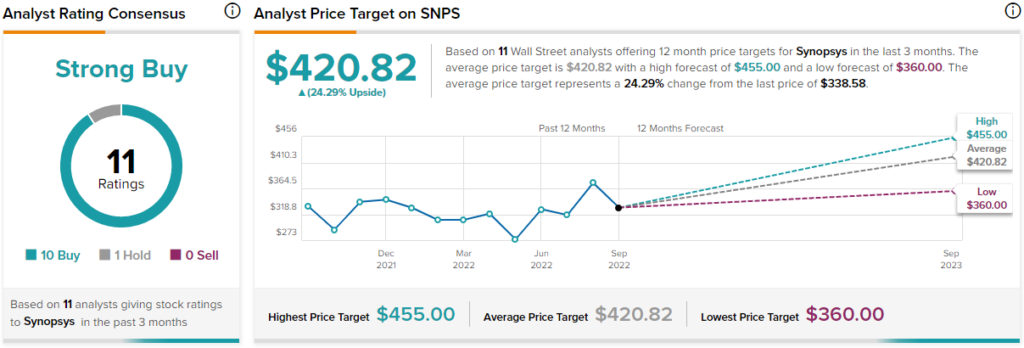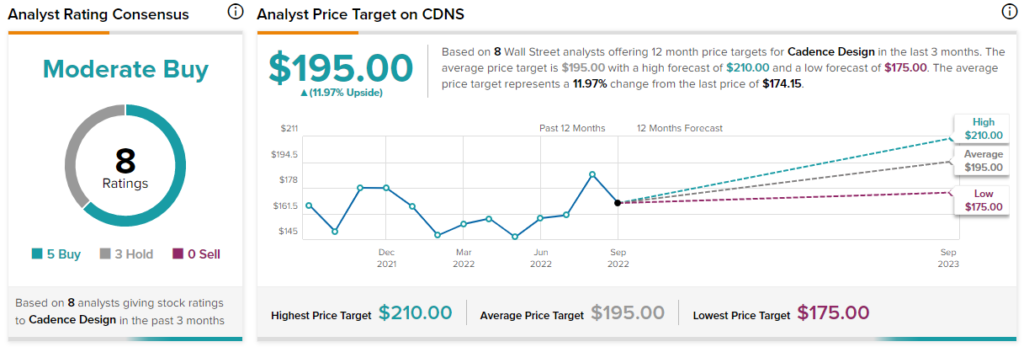As the “chip war” rages on between the U.S. and China, the Biden administration is reported to be considering investment restrictions once again. With an uncertain future regarding American investments in China and other potentially hostile countries, it makes sense to invest in U.S. tech players that have the upper hand in this situation. Chip-design solutions (Electronic Design Automation-EDA) providers Synopsys (NASDAQ:SNPS) and Cadence Design Systems (NASDAQ:CDNS) look like solid choices.
Confident Investing Starts Here:
- Quickly and easily unpack a company's performance with TipRanks' new KPI Data for smart investment decisions
- Receive undervalued, market resilient stocks straight to you inbox with TipRanks' Smart Value Newsletter
What’s Happening Between the U.S. and China?
China is a tech powerhouse. The sheer number of electronics factories and consumers in China makes it the biggest buyer of semiconductor chips from the U.S. However, Washington is worried that China’s access to the most advanced chips produced in the U.S. might allow the latter country to enhance its computational power across its economy, particularly in its military systems.
The plight of the U.S. semiconductor companies is not likely to end anytime soon. Supply-chain snags are already playing spoilsport in the U.S. semiconductor industry. Then came the China-Taiwan-U.S. tug-of-war, with the U.S. and China vying fiercely for control over TSMC (NYSE:TSM), which opened the gates to further political abhorrence.
Now, the fact that U.S. chip companies may not be able to use their government grants to set up factories in the highly resourceful China (which is turning increasingly hostile to the U.S., thanks to its support for Russia) may be another bump on the road.
Understandably, investors are losing sleep over the prospects of their favorite semiconductor stocks and whether or not they should have faith and scoop the stocks up now that prices have dropped. However, the situation is far from hopeless.
How Will China’s Restrictions Affect the U.S. Economy?
There are certain costs to the U.S. economy in case of a decoupling of the U.S. and China. Boston Consulting Group predicts that decoupling will wipe out about 18% of the market share of U.S. companies and 37% of their revenues. Also, various impositions on the world’s second-largest economy may lead to retaliatory restrictions from China. However, the chances of that happening may not be too large.
China is heavily reliant on specific American technologies to smoothly run its supply chains. How? Tools that produce integrated-circuit-designing hardware and software are sourced from the U.S.’s massive chip design tools industry. These tools are the essence of the functioning of the computer chips that are manufactured in China. Overall, China’s entire tech-intensive supply chain ecosystem stands on American chip design tools (EDA tools).
Market intelligence firm TrendForce points out that Empyrean Technology, which is the leader of China’s EDA industry, is still quite far behind the American EDA industry in terms of technological prowess, revenue, and overall influence.
Now, suppose China buys a large amount of authorized EDA software quickly before the ban on investment materializes. In this case, the software would still need to connect to U.S.-controlled developers for license updates to be activated.
So, if the sale of design tools to China is restricted, or American investments in manufacturing plants of these tools on Chinese soil are banned, then it is more of a loss for China than the U.S., meaning that China will most likely rather want to negotiate a deal. This may lead to a favorable outcome for American design tool companies, which have a strong upper hand in this case.
Why Consider SNPS and CDNS Stocks?
Interestingly, only three U.S.-based companies — Synopsys, Cadence Design Systems, and Mentor Graphics — have an oligopolistic command over the global EDA industry.
According to TrendForce, Synopsys, Cadence, and Mentor constituted 32%, 30%, and 13% of the global EDA software market, respectively, in 2021.
Needless to say, these companies are most likely to recover any loss of business to China faster than most, given the global demand for their solutions. Also, any negotiation attempts from China’s end are likely to be in favor of continued access to the solutions of these companies.
Synopsys
EDA leader Synopsys is growing on the back of solid and consistent customer demand for advanced computing. The company’s solutions help solve customers’ challenges in design verification. Most importantly, any loss of business to China is not expected to affect the company much.
About 58% of Synopsys’ customers are in the U.S., according to a report by Enlyft. Chinese customers constitute about 1% of the total customer base of the company.
Amid the growing hostilities between the U.S. and China, five-star-rated JPMorgan (NYSE:JPM) analyst Harlan Sur recently reiterated a Buy rating on Synopsys and even raised his price target to $440 from $400. “As we have previously written, EDA fundamentals remain strong, and EDA is one of the most defensive segments of the semiconductor value chain in a macro downturn given that chip design is tied to semiconductor company RD budgets (which don’t get cut in downturns),” said Sur.
What is the Price Target for SNPS Stock?
Wall Street is equally bullish on Synopsys, with a Strong Buy rating based on 10 Buys and one Hold. The average SNPS stock price prediction comes in at $420.82, indicating upside potential of 24.3% from current levels.

Cadence Design Systems
Another design tool provider, Cadence Systems, is quickly gaining traction from healthy demand for its diversified product portfolio.
Its expanding footprint in the ever-evolving pharmaceutical and biotechnology market, with the help of its acquisition of OpenEye Scientific Software, is helping it spread its roots in the EDA ecosystem. The acquisition is expected to be accretive to revenues by $40 million in Fiscal 2023.
The company is navigating high R&D costs and supply-chain woes with impressive perseverance. In the second quarter of 2022, the company’s sales and profitability outperformed its competitors.
Investors may, however, find that the company’s exposure to China has consistently been high. In Q2, 45% of revenues came from China. Nonetheless, given the dominance of Cadence on a global level, demand for its solutions is highly likely to overcompensate for any hit to its business in the short run.
What is the Price Target for CDNS Stock?
Cadence is a Moderate Buy on Wall Street, based on five Buys and three Holds. The average CDNS price target is $195, presenting 12% upside potential.

Conclusion: Synopsys and Cadence Could be Solid Opportunities
Overall, it is still too early to say how far the restrictions on business with China will go. However, it may be an immense opportunity for investors to cash in on the upper hand that U.S. EDA players in the global market have in this situation. Synopsys and Cadence, being world leaders in this niche technology market, seem to be the best buys for long-term returns.










